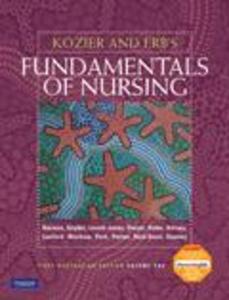Concepts of growth and development
Baldwin, Adele (2010) Concepts of growth and development. In: Berman, Audrey, Snyder, Shirlee J., Kozier, Barbara, Erb, Glenora, Levett-Jones, Tracy, Dwyer, Trudy, Hales, Majella, Harvey, Nichole, Luxford, Yoni, Moxham, Lorna, Park, Tanya, Parker, Barbara, Reid-Searl, Kerry, and Stanley, David, (eds.) Kozier and Erb's Fundamentals of Nursing. Pearson Australia, Frenchs Forest, NSW, Australia, pp. 362-380.
![[img]](https://researchonline.jcu.edu.au/16201/2.hassmallThumbnailVersion/16201_Baldwin_2010_Book_Cover.jpg)
|
Image (JPEG) (Book Cover)
- Cover Image
Download (5kB) |
|
|
PDF (Published Version)
- Published Version
Restricted to Repository staff only |
Abstract
For years Kozier & Erb’s Fundamentals of Nursing has been the gold standard in helping students embarking on their nursing careers. This first Australian edition retains many of the features that have made this textbook the number-one choice of nursing students and lecturers.
To further enhance this popular fundamentals textbook and ensure its appropriate application for Australian students, nursing academics from across Australia were invited to review and comment on each of the 52 chapters. Their detailed feedback has ensured that Kozier & Erb’s Fundamentals of Nursing: First Australian Edition is a current, engaging and uniquely Australian textbook that will help students succeed in their nursing studies.
Kozier and Erb’s Fundamentals of Nursing, First Australian Edition presents the fundamentals of nursing care within the framework of the nursing process. This text offers an accessible writing style; a focus on practical application with real-world Australian examples and case studies; appropriate Australian terminology, policies and procedures, Australian visuals; an integrated approach to Australian Indigenous health issues; and up-to-date references, research and codes of practice, with reference to ANMC guidelines. The text is supported by a state-of-the art technology package to enhance the learning process.
Chapter 20: The terms growth and development both refer to dynamic processes. Often used interchangeably, these terms have different meanings. Growth is physical change and increase in size. It can be measured quantitatively. Indicators of growth include height, weight, bone size and dentition. The pattern of physiologic growth is similar for all people. However, growth rates vary during different stages of growth and development. The growth rate is rapid during the prenatal, neonatal, infancy and adolescent stages and slows during childhood. Physical growth is minimal during adulthood.
Development is an increase in the complexity of function and skill progression. It is the capacity and skill of a person to adapt to the environment. Development is the behavioural aspect of growth (e.g. a person develops the ability to walk, to talk and to run).
Growth and development are independent, interrelated processes. For example, an infant's muscles, bones and nervous system must grow to a certain point before the infant is able to sit up or walk. Growth generally takes place during the first 20 years of life; development takes place during that time and also continues after that point. Principles of growth and development are shown in Box 20.1.
LEARNING OUTCOMES - Differentiate between the terms growth and development. - Describe essential principles related to growth and development. - List factors that influence growth and development. - Explain the concept of temperament. - Describe the stages of growth and development according to various theorists. - Describe characteristics and implications of Freud's five stages of development. - Identify Erikson's eight stages of development. - Identify developmental tasks associated with Havighurst's six age periods. - Compare Peck's and Gould's stages of adult development. - Explain Piaget's theory of cognitive development. - Compare Kohlberg's and Gilligan's theories of moral development. - Compare Fowler's and Westerhoff's stages of spiritual development.
| Item ID: | 16201 |
|---|---|
| Item Type: | Book Chapter (Teaching Material) |
| ISBN: | 978-1-4425-0469-1 |
| Keywords: | accommodation, adaptation, adaptive mechanisms, assimilation, cognitive development, defence mechanisms, development, developmental stage, developmental task, ego, fixation, growth, libido, moral, moral behaviour, moral development, morality, personality, superego, temperament, unconscious mind |
| Related URLs: | |
| Additional Information: | An updated version of this chapter can be found at the related URL. |
| Date Deposited: | 20 Apr 2011 22:44 |
| FoR Codes: | 11 MEDICAL AND HEALTH SCIENCES > 1110 Nursing > 111099 Nursing not elsewhere classified @ 100% |
| SEO Codes: | 92 HEALTH > 9202 Health and Support Services > 920210 Nursing @ 100% |
| Downloads: |
Total: 1008 Last 12 Months: 12 |
| More Statistics |



